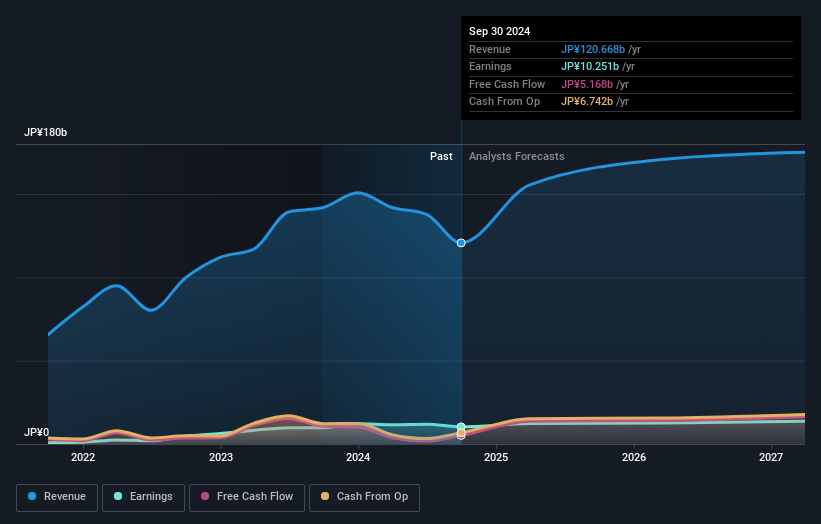Tsuburaya Fields Holdings Inc. (TSE:2767) CEO Hidetoshi Yamamoto's holdings dropped 8.3% in value as a result of the recent pullback

Key Insights
- Tsuburaya Fields Holdings' significant insider ownership suggests inherent interests in company's expansion
- The top 5 shareholders own 54% of the company
- 31% of Tsuburaya Fields Holdings is held by Institutions
If you want to know who really controls Tsuburaya Fields Holdings Inc. (TSE:2767), then you'll have to look at the makeup of its share registry. With 40% stake, individual insiders possess the maximum shares in the company. Put another way, the group faces the maximum upside potential (or downside risk).
As market cap fell to JP¥117b last week, insiders would have faced the highest losses than any other shareholder groups of the company.
Let's delve deeper into each type of owner of Tsuburaya Fields Holdings, beginning with the chart below.
View our latest analysis for Tsuburaya Fields Holdings

What Does The Institutional Ownership Tell Us About Tsuburaya Fields Holdings?
Institutional investors commonly compare their own returns to the returns of a commonly followed index. So they generally do consider buying larger companies that are included in the relevant benchmark index.
We can see that Tsuburaya Fields Holdings does have institutional investors; and they hold a good portion of the company's stock. This suggests some credibility amongst professional investors. But we can't rely on that fact alone since institutions make bad investments sometimes, just like everyone does. It is not uncommon to see a big share price drop if two large institutional investors try to sell out of a stock at the same time. So it is worth checking the past earnings trajectory of Tsuburaya Fields Holdings, (below). Of course, keep in mind that there are other factors to consider, too.

Tsuburaya Fields Holdings is not owned by hedge funds. With a 25% stake, CEO Hidetoshi Yamamoto is the largest shareholder. For context, the second largest shareholder holds about 12% of the shares outstanding, followed by an ownership of 7.7% by the third-largest shareholder.
On looking further, we found that 54% of the shares are owned by the top 5 shareholders. In other words, these shareholders have a meaningful say in the decisions of the company.
While it makes sense to study institutional ownership data for a company, it also makes sense to study analyst sentiments to know which way the wind is blowing. While there is some analyst coverage, the company is probably not widely covered. So it could gain more attention, down the track.
Insider Ownership Of Tsuburaya Fields Holdings
The definition of an insider can differ slightly between different countries, but members of the board of directors always count. Company management run the business, but the CEO will answer to the board, even if he or she is a member of it.
I generally consider insider ownership to be a good thing. However, on some occasions it makes it more difficult for other shareholders to hold the board accountable for decisions.
It seems insiders own a significant proportion of Tsuburaya Fields Holdings Inc.. Insiders have a JP¥47b stake in this JP¥117b business. This may suggest that the founders still own a lot of shares. You can click here to see if they have been buying or selling.
General Public Ownership
The general public, who are usually individual investors, hold a 24% stake in Tsuburaya Fields Holdings. While this size of ownership may not be enough to sway a policy decision in their favour, they can still make a collective impact on company policies.
Private Company Ownership
We can see that Private Companies own 5.1%, of the shares on issue. Private companies may be related parties. Sometimes insiders have an interest in a public company through a holding in a private company, rather than in their own capacity as an individual. While it's hard to draw any broad stroke conclusions, it is worth noting as an area for further research.
Next Steps:
I find it very interesting to look at who exactly owns a company. But to truly gain insight, we need to consider other information, too. Consider risks, for instance. Every company has them, and we've spotted 2 warning signs for Tsuburaya Fields Holdings you should know about.
If you are like me, you may want to think about whether this company will grow or shrink. Luckily, you can check this free report showing analyst forecasts for its future.
NB: Figures in this article are calculated using data from the last twelve months, which refer to the 12-month period ending on the last date of the month the financial statement is dated. This may not be consistent with full year annual report figures.
Valuation is complex, but we're here to simplify it.
Discover if Tsuburaya Fields Holdings might be undervalued or overvalued with our detailed analysis, featuring fair value estimates, potential risks, dividends, insider trades, and its financial condition.
Access Free AnalysisHave feedback on this article? Concerned about the content? Get in touch with us directly. Alternatively, email editorial-team (at) simplywallst.com.
This article by Simply Wall St is general in nature. We provide commentary based on historical data and analyst forecasts only using an unbiased methodology and our articles are not intended to be financial advice. It does not constitute a recommendation to buy or sell any stock, and does not take account of your objectives, or your financial situation. We aim to bring you long-term focused analysis driven by fundamental data. Note that our analysis may not factor in the latest price-sensitive company announcements or qualitative material. Simply Wall St has no position in any stocks mentioned.
About TSE:2767
Tsuburaya Fields Holdings
Engages in the content-related businesses in Japan.
Flawless balance sheet, undervalued and pays a dividend.
Market Insights
Community Narratives




